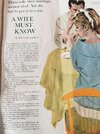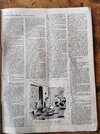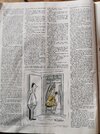I have finished reading the novel Ever Yours, Annabelle, Elisa Braden, from the Huxley series. As well as the first five novels in this series (The Madness of Viscount Atherbourne, The Truth About Cads and Dukes, Desperately Seeking a Scoundrel and The Devil is a Marquess) although by mistake, I read at the end this novel which should have been the first.
I found this to be the sweetest of the first five novels in this series. Although in general I was annoyed or angry with Annabelle's character, because of her recklessness and being so obsessive with Robert, (although it seems to me that this is a common trait of the female characters in these first novels, except for one of them, where it is a male character who stars irresponsibility and recklessness) although later she seems to redirect her impulsivity into something constructive.
I could not understand Annebelle's obsession with Robert, the obvious thing in the story is the drama that develops as part of the love story, but I felt that it is a little sick that a person is so obsessed with another person, I do not know, which makes me think that a similar story in real life, perhaps, would not have a happy ending, because it seems to me that the obsession would have to do more a problem of the sufferer and not a persistence or excessive interest in something.
I've finished the Survivors' Club series. I found the first book to be the most emotional. There's no obvious pattern as to what will cause an emotional reaction and what I will read with complete indifference, it just happens sometimes (examples: Gwen watching Hugo with his lambs, the Lieutenant speaking in defence of Hugo and the truth). I think there's lots of examples of people acting with honour and integrity, but out of love or care for others instead of just rigid principles or duty. These situations are just satisfying, for want of a better word, and really rare in everyday real life. I think one thing that is required in all these scenarios is courage, that might be the underlying theme. Courage to trust someone, courage to be honest about your faults and let go of the things that you know are harmful or hold you back even though they served a purpose.
To what you say Ben, about the
emotional impact, (I stopped reading the novels six months ago, and only recently resumed reading them to finish one more of the Huxley series) it never ceases to amaze me about the internal emotional dimension that can make these readings, it sure depends on each individual person, I do not understand how sometimes consciously know that they are just stories and sometimes seem very simple or silly, they make me cry or make me feel a lot of discomfort. That is, it just surfaces, it's not something you can consciously control.
It has happened to me in my dreams, it makes me wonder how long we can keep feelings without letting them go, they can be with us without realizing it. They can affect us or be present without consciously noticing them or affecting our lives. It's strange, I certainly don't know how to explain. It happens to me that lately I have had dreams with old partners or passing boyfriends in my youth, that present very strong feelings in the dream, or with my mother, when I lied to her to be able to enjoy my freedom or simply not coming home when I decided to do so.
It seems funny at the same time, in this time frame of the 1800's, where these novels take place, I had 3 dreams, - in one of them I was in a couple with a man, I felt that I was his friend or lover, we were going to a place and we were walking along a stone street, everything happened at night and there was very dim lighting as if it were candles, I saw the long dresses and suits of the men as if they belonged to this time, with a tall hat, it did not seem too luxurious, just maybe like upper middle class, we arrived at the place and inside everything seemed to be made of stones and illuminated with candles, then a woman was talking loudly to the group of people in which I was, then I felt uneasy, I was a little afraid of the man I was with, I think I saw myself as a mid 20 years old and this man looked like 50 years old, but what worried me is that this man was not the age he looked, I felt that this man only had a human "disguise", then a woman helps me to escape, she took me by the hand and we both left this place.
- In another dream I was in front of a mirror, it was about the size of a door but wider, I looked like a teenager, probably less than 18 years old, and a woman was next to me helping me get dressed, because I was going to get married, the curious thing is this abundant clothing, it had the impression of being from the XIX century.
-In another one of those dreams, it was very short, I was on the arm of a woman, we were both wearing these long and abundant dresses, they were white and we were wearing a simple hat, we were walking very fast like running away, I had a very intense feeling that I was doing wrong, I felt like I was in a couple relationship with her. It was very strong.
" really rare in everyday real life" , I have the impression that what these novels do, or what has happened to me, is that they confront you with your own experience, surely in everyday life, sometimes we forget to meditate or be more aware of how we feel internally or emotionally in the present, it has happened to me or I have seen that I have kept many past feelings of which, it seems that I did not process at the time, when they happened in the past.









 .
. . So reading that book was not a walk in the park for me. It took me several days to process this resurgence of feelings and memories, of letting them go through me once more, of forgiving and praying for my younger self who was so confused, so lost, so angry at the world because she couldn't see her own worth yet. I blessed those I crossed path with who showed me I wasn't worthless. I can't thank those who hurted me and I can't say I forgive them yet, but dealing with them made me stronger, more knowledgable.
. So reading that book was not a walk in the park for me. It took me several days to process this resurgence of feelings and memories, of letting them go through me once more, of forgiving and praying for my younger self who was so confused, so lost, so angry at the world because she couldn't see her own worth yet. I blessed those I crossed path with who showed me I wasn't worthless. I can't thank those who hurted me and I can't say I forgive them yet, but dealing with them made me stronger, more knowledgable.